Welcome
....to JusticeGhana Group

JusticeGhana is a Non-Governmental [and-not-for- profit] Organization (NGO) with a strong belief in Justice, Security and Progress....” More Details
Tech solutions from Africa: The next big thing
- Details
- Category: The World
- Created on Friday, 04 July 2014 00:00
- Hits: 5086
 Tech solutions from Africa: The next big thing
Tech solutions from Africa: The next big thing
Unbridled enthusiasm for mobile phones, an up-and-coming Internet scene, a population where every second person is younger than 25 - all this represents fertile breeding ground for digital innovation.
Paying for a taxi ride in Nairobi's business district is quick and easy - via mobile phone. On the road but have to transfer money to your mother back at home in the village? Pull out you mobile phone, and it's done in a matter of seconds.
Kenya's mobile phone-based money transfer system M-Pesa is a success story. Two out of three Kenyans use the electronic wallet. The idea has meanwhile spread from the African continent to Afghanistan and Romania.
This success story is seven years old, however - and Africa's tech startup scene hasn't been able to meet expectations for the "next big thing" for mobile phones and tablets.
"The entire industry in Kenya, Nigeria and Ghana is still quite young," said Julia Manske. Speaking at the DW Global Media Forum in Bonn earlier this week, Manske recalled her impressions of Africa's digital scene during a recent visit on behalf of the Vodafone Institute.
Programmers in Kenya's capital Nairobi - also known as the "Silicon Savannah" - are particularly active, she said.
"But if you compare it to Silicon Valley in California, the universities are missing as supporters in the background," Manske explained, adding that there is also a lack of former founders who reinvest their profits in new ideas. In Africa, there is often a lack of capital, she said, and it takes many flops and failures "before some startups become established."
Rent comes first
Turning ideas into cash is particularly difficult for IT experts in poorer countries like Kenya. Many young entrepreneurs struggle to pay their rent and put food on the table, which makes it difficult to concentrate on business. "In some regions, Internet access is still slow and not very stable," Manske added.
As a result, failure is the rule and not the exception in Africa's Internet startup scene. Manske recalled a startup that planned to sell clothes on the Internet. "That didn't work because in many African countries, there is simply no infrastructure - that is, roads and suppliers."
A second M-Pesa may still be on the horizon, however. Manske pointed to several African success stories: the open-source software, the platform, and the router that aims to give people Internet access even in the middle of nowhere.
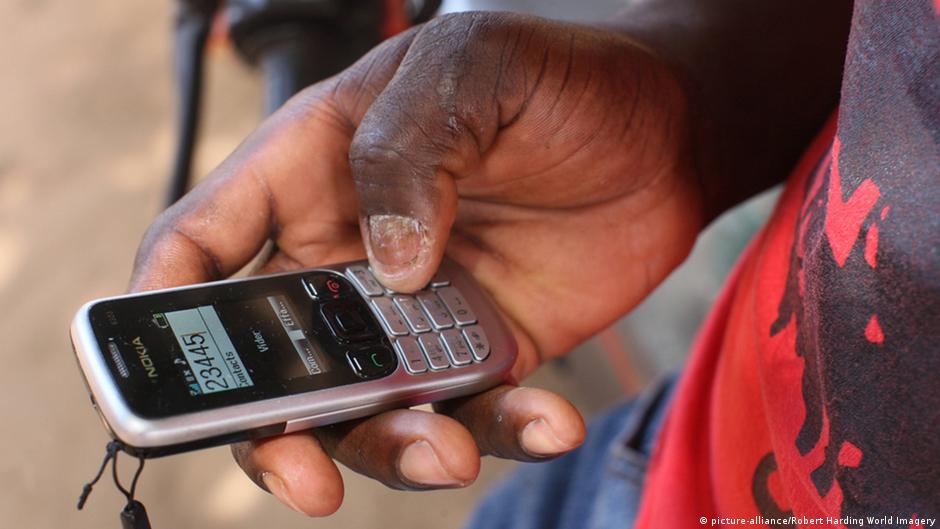
Postnatal messaging
African programmers may even find a future in the "mobile health" field. In regions with few clinics and fewer medical charts, a medical app could be an alternative.
So could the good old text message: "Text messages helped show me how best to care for my baby," said Melisa Ali, a new mother from Tanzania. She is one of about 400,000 subscribers to one of Africa's largest mobile health campaigns, the "Healthy Baby" service. Mothers and expecting mothers receive individually tailored information on their cell phone. "My husband told me about it; he registered first and passed it on to me," Ali said. "I registered after my child was born, as a new mother."
From Amsterdam to Arusha
The technology the service uses is European. Amsterdam-based social enterprise developed the platform for interactive SMS campaigns.
"It's a partnership," said founder Bas Hoefman. The Tanzanian health ministry is at the helm, while many organizations are involved, he said, adding that "Mobile phone providers nationwide participate." Partnerships, he explained, are at the heart of such projects aimed at reaching large numbers of people.
Perhaps cooperation across continents between entrepreneurs, IT experts, and investors is the real recipe for success for the next big thing from Africa.
Because ultimately - thanks to newly-installed wide-band cables - Silicon Valley and the Silicon Savannah are only a few tenths of a second apart.
Date 03.07.2014
Author Peter Hille / db
Editor Sonya Diehn
Source: Deutsche Welle
Habermas: A philosopher for the public
- Details
- Category: DateLines
- Created on Sunday, 22 June 2014 00:00
- Hits: 5492
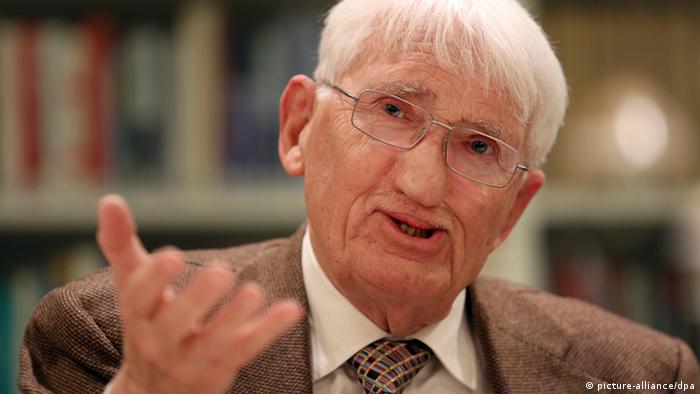 Habermas: A philosopher for the public
Habermas: A philosopher for the public
Democracy and the engagement of the public are at the heart of Jürgen Habermas' work. The philosopher promotes discourse - and has consistently generated discussion himself. He turns 85 on June 18.
For Jürgen Habermas, modern society is characterized by a bureaucratic democracy in which compromises are brokered without transparency. In response, the German philosopher has appealed for greater political participation in civil society. His work describes a "liberal public" and recalls a time when citizens used to meet in coffee houses to discuss how to influence their society.
His astute social diagnoses, such as in his book "The Structural Transformation of the Public Sphere," his public positions on controversial issues, and his contributions to analytical and political philosophy have made Habermas one of the most renowned contemporary intellectuals in the world.
Truth through communication
"A common thread that runs through Habermas's theory is democracy, which he once called the 'magic word' of his thinking," explained sociologist and Habermas biographer Stefan Müller-Doohm.
"That includes the view that the capitalist economic system must be "tamed" by democratic means," added Müller-Doohm. For Habermas, democracy always incorporates the public sphere - "that's actually another expression for what characterizes his philosophy - namely discourse ethics," says Müller-Doohm.
Unlike other postmodern thinkers, Habermas believes universal truths and moral principles can exist in a globalized world where so many different cultures converge. According to him, these can be found through public discourse and consensus, as long as the protagonists don't think strategically - as is common in politics - but are open to understanding others and follow certain "rules of discourse."
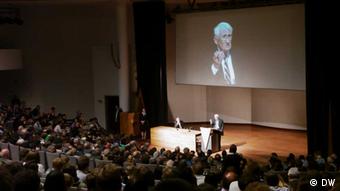 Taking others seriously, presuming them to be honest and moral, giving everyone an equal chance to express themselves, and avoiding any kind of coercion are among Habermas' guideless for discourse.
Taking others seriously, presuming them to be honest and moral, giving everyone an equal chance to express themselves, and avoiding any kind of coercion are among Habermas' guideless for discourse.
"Habermas speaks of 'the unforced force of the better argument,' " explained Müller-Doohm. "The arguments that come out at the end can temporarily be defined as truth - although there are no ultimate truths, only temporary ones."
Unsurprisingly, Habermas has been criticized for relying on idealized situations of discourse that don't normally exist in real life.
Dealing with Germany's past
For Habermas' biographer, democracy played a major role in the philosopher's life because of his personal experiences. The key one came in 1945, when he "realized that he'd been living under a criminal regime and there had been a regression to barbarism," explained Müller-Doohm.
Habermas was born in Düsseldorf in 1929 and grew up in nearby Gummersbach, so he was a teenager when the wave of Nazi terror overtook his country. Later, in the 1980s, he would criticize historian Ernst Nolte for attempting to draw parallels between National Socialist crimes and those committed by the Stalinists. For Habermas, Nazis' atrocities could never be relativized.
Adorno's protegé
Even as a young man, Habermas was engaged in social issues. After studying philosophy, economics, and German literature, he graduated in 1954 and worked as a freelance journalist for the daily Frankfurter Allgemeine Zeitung, among others.
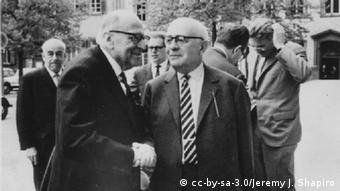 His texts caught the attention of philosopher Theodor W. Adorno (1903-1969), considered a co-founder of critical theory and a leading member of the so-called Frankfurt School, which pursued neo-Marxist interdisciplinary social theory. Adorno brought Habermas to the Frankfurt Institute for Social Research and influenced him with his critical social analysis, which - in a nutshell - aimed to disclose the ideological principles of power.
His texts caught the attention of philosopher Theodor W. Adorno (1903-1969), considered a co-founder of critical theory and a leading member of the so-called Frankfurt School, which pursued neo-Marxist interdisciplinary social theory. Adorno brought Habermas to the Frankfurt Institute for Social Research and influenced him with his critical social analysis, which - in a nutshell - aimed to disclose the ideological principles of power.
Because of the antipathy of institute director Max Horkheimer to Habermas, the young philosopher was obliged to habilitate in Marburg, some 90 kilometers from Frankfurt. But Habermas returned in 1964 - as a professor of philosophy and sociology, and as Horkheimer's successor.
Conflict with the left
In the 1960s Frankfurt became the scene of violent student protests, when Habermas supported political participation through civil disobedience. He distanced himself from radical groups and the student leader Rudi Dutschke, whom he accused of left-wing fascism in a lecture entitled "The Phantom Revolution and Its Children." His stance drew heavy criticism from the left in Germany.
In 1971, Habermas left Frankfurt to became co-director of the Max Planck Institute in Starnberg, outside Munich. It was during his 12 years there that he published his most famous work, "The Theory of Communicative Action," focusing on the reorganization of social integration through communication, and developed his theory of intersubjectivity and communicative rationality.
In 1983, Habermas returned to Frankfurt again to serve as professor of philosophy until his retirement in 1994.
Global vision
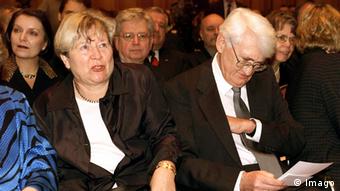 But even in retirement, Habermas continued to influence Germany's social discourse. In 1999, he stirred controversy by publically supporting NATO's intervention in the war in Kosovo. At the time, he insisted that democratic neighbors must be able to provide military aid in accordance with international law - when there is no alternative.
But even in retirement, Habermas continued to influence Germany's social discourse. In 1999, he stirred controversy by publically supporting NATO's intervention in the war in Kosovo. At the time, he insisted that democratic neighbors must be able to provide military aid in accordance with international law - when there is no alternative.
Though a proponent of European integration, Habermas regularly pointed out the faults in the European Union's democratic structures. During the euro crisis, he spoke out against austerity and in favor of a "supernational" democracy beyond the monetary union, in which member states would secede more of their national sovereignty.
"What he pictures is global citizenship without a world government," summed up Müller-Doohm. "And a united Europe is an important force in achieving this goal."
Jürgen Habermas received numerous accolades over the course of his career, most notably the Hessian Culture Prize and the German Book Trade's Peace Prize.
Date 18.06.2014
Author Christina Ruta / kbm
Editor Ben Knight
Source: Deutsche Welle
Peres: The end of an era
- Details
- Category: DateLines
- Created on Friday, 13 June 2014 00:00
- Hits: 5192
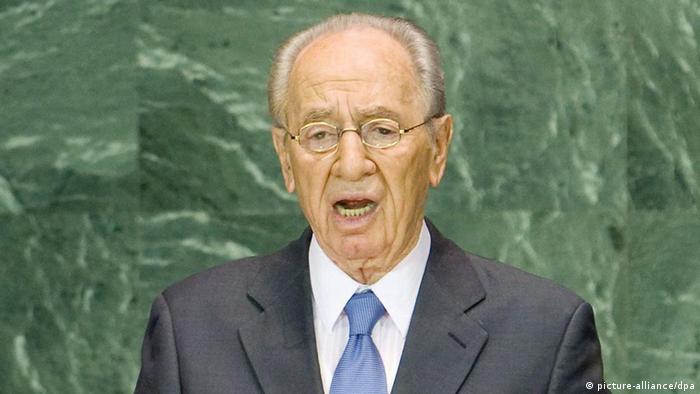 Peres: The end of an era
Peres: The end of an era
Israel's parliament elected the country's new president, which means Shimon Peres will step down in July after seven years in office. His legacy is a contested one.
It's the end of an era in Israel. Shimon Peres, the country's much-loved, 90-year-old president whose life and work are closely intertwined with the history of the country, will step down. His successor, Israeli lawmakers choose Reuven Rivlin as new president Reuven Rivlin, won't officially take office until 27 July, but Israelis are already getting nostalgic.
In the Mahane Yehuda market in Jerusalem, a young Israeli woman named Chen has nothing but praise for Peres' presidency. "He's a real statesman. He somehow manages to represent all Israelis," she said. "He did some things in the rest of his political career that I didn't like, but as president he did a good job."
Another passerby, Guy, commented that "Peres managed both to represent Israel in the rest of the world, and also to be in touch with the people." Others said they just hope the new president will be "like Peres."
Peres is seen as the diplomatic face of Israel abroad. He continually took on the role of the country's chief diplomat, working to mediate and reconcile. He was often called upon to do this when Prime Minister Benjamin Netanyahu's right-wing, settler-friendly government had upset the international community with plans for more new settlements in the West Bank. Observers agree that Peres' shoes will not be easy to fill.
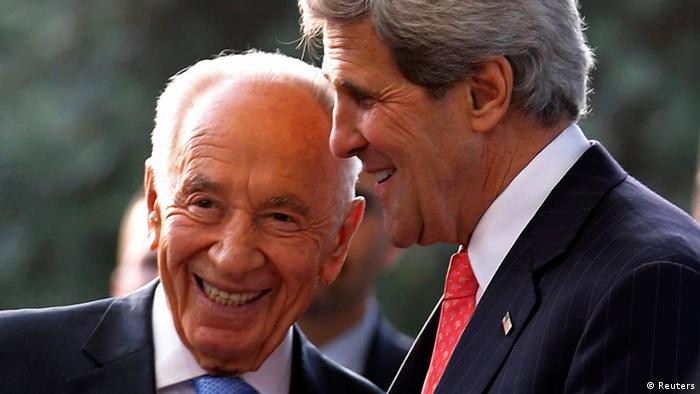
Stormy candidacies
And the Israeli media has noted that it will be even more difficult after a presidential race marked by scandal and political maneuvering. There were initially six candidates. But last weekend, just three days before the election, one of the most promising candidates from the social-democratic Labour Party, Binyamin Ben-Eliezer, was forced to pull out of the race. He was questioned by police on Friday about the financing of a luxury apartment.
Ben-Eliezer, who is an Israeli political heavyweight, described the timing as a "targeted assassination" of his candidacy. The Israeli media responded with mockery: Columnist Nahum Barnea wrote in the daily Yediot Ahronot that every future candidate should be advised "to check whether he still has any skeletons hidden in the closet before putting his name forward."
The president is elected by parliament, not by the people. But the result is hard to predict, as the politicians in the Knesset will be trying to forge alliances right up until the vote - and the ballot itself is a secret one.
Political maneuvering
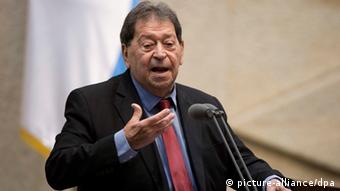 If the Israeli people could choose their president themselves, some 30 percent would want Likud politician Reuven Rivlin as Peres' successor. But Rivlin's candidacy hasn't been a smooth one, either. For a long time, his own fellow party member Netanyahu refused to support him.
If the Israeli people could choose their president themselves, some 30 percent would want Likud politician Reuven Rivlin as Peres' successor. But Rivlin's candidacy hasn't been a smooth one, either. For a long time, his own fellow party member Netanyahu refused to support him.
The two politicians are said to have a difficult relationship. Netanyahu initially wanted the election to be postponed by half a year; then, according to Israeli media, he tried to abolish the office of president altogether. Only when the election could no longer be avoided and the date was set for June 10 did Netanyahu publicly announce his support for Rivlin - an about-face that provoked some derisive commentary.
Rivlin, 74, is a member of the Likud old guard. He's the candidate of the political right. Unlike Peres, he is opposed to a Palestinian state. He's seen as a nationalist: he rejects a two-state solution and is in favor of settlement-building.
As speaker of the Knesset, however, he often blocked the course of Netanyahu's coalition, and fell out with Netanyahu during his second term in office. The prime minister removed him as parliamentary speaker without offering a reason.
The competition
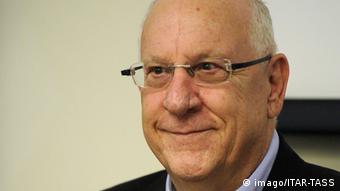 So far, polls indicate that Rivlin may well get through to the second round of voting. He may even surprise everyone by getting the required absolute majority in the first round. If not, he could end up going head-to-head with the former parliamentary President Dalia Itzik.
So far, polls indicate that Rivlin may well get through to the second round of voting. He may even surprise everyone by getting the required absolute majority in the first round. If not, he could end up going head-to-head with the former parliamentary President Dalia Itzik.
And now that Ben-Eliezer is out of the running, 61-year-old Itzik may benefit. A former member of parliament for Labour, she switched to the centrist Kadima party founded by Ariel Sharon in 2005 and became the first female speaker of the Knesset.
A third Knesset member, Meir Shetrit of the centrist Hatnua ("The Movement") Party, is also running for the presidency, as are two political outsiders: Daliah Dorner, a former high court judge, and 73-year-old scientist Dan Shechtman, who was awarded the Nobel Prize for chemistry in 2011. He wants to promote better education, and support academic studies and research.
However, as observers point out, even if the role of president is primarily a representative one, both these outsiders lack political experience, putting them at a disadvantage.
Date 10.06.2014
Author Tania Krämer, Jerusalem / cc
Editor Sonya Diehn
Source: Deutsche Welle
Saving Papua New Guinea's rare tree kangaroo
- Details
- Category: The World
- Created on Monday, 16 June 2014 00:00
- Hits: 9954
 Saving Papua New Guinea's rare tree kangaroo
Saving Papua New Guinea's rare tree kangaroo
Australian zookeepers Jean and Jim Thomas have spent the past decade working with the people of Papua New Guinea to preserve the Tenkile, an endangered tree kangaroo that was on the verge of extinction when they started.
For more than a decade, 42-year-old Jean Thomas and her husband, Jim Thomas, 47, have made their home in the remote mountainous jungles of Papua New Guinea. Both trained zookeepers, they left Australia in 2002 to join the Tenkile Conservation Alliance (TCA) - and started their mission to save a little-known species of tree kangaroo, the Tenkile, which was under threat of imminent extinction.
"At that stage we knew nothing about Papua New Guinea," Jean Thomas said. "We'd have to climb mountains and try and convince people not to hunt tree kangaroos, which they'd been hunting for thousands of years."
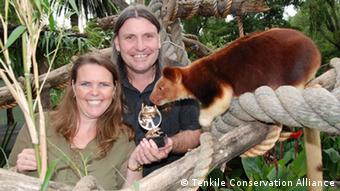 The Tenkile - also known as the Scott's tree kangaroo - is one of 17 species of tree kangaroo found in Papua New Guinea. Only discovered by Western scientists in 1989, it lives in a 125 hectare region in the Torricelli Mountain Range in Papua New Guinea's north-east. Traditionally a prized catch for local hunters, and under pressure from a rising human population, by 2004 Tenkile numbers had dwindled to around 100, making it one of the planet's most critically endangered species.
The Tenkile - also known as the Scott's tree kangaroo - is one of 17 species of tree kangaroo found in Papua New Guinea. Only discovered by Western scientists in 1989, it lives in a 125 hectare region in the Torricelli Mountain Range in Papua New Guinea's north-east. Traditionally a prized catch for local hunters, and under pressure from a rising human population, by 2004 Tenkile numbers had dwindled to around 100, making it one of the planet's most critically endangered species.
Turning hunters into animal lovers
"Our job was to try turn the hunters into animal lovers, to make them care enough to limit their hunting to give those species a chance to start increasing in their numbers again," Jean Thomas told DW in Melbourne.
Over a decade on, thanks to TCA, Tenkile numbers have more than doubled and the animal is no longer considered in danger of imminent extinction - though it remains critically endangered. Jean and Jim Thomas have won many awards for their work, including the prestigious Australian Geographic Conservationist of the Year in 2013.
Motivated by the plight of the Tenkile tree kangaroo, TCA have spurned the conventional of wisdom captive breeding programs, where animals are simply bred and released into the wild. Instead, TCA works with local communities to tackle the underlying causes of species decline.
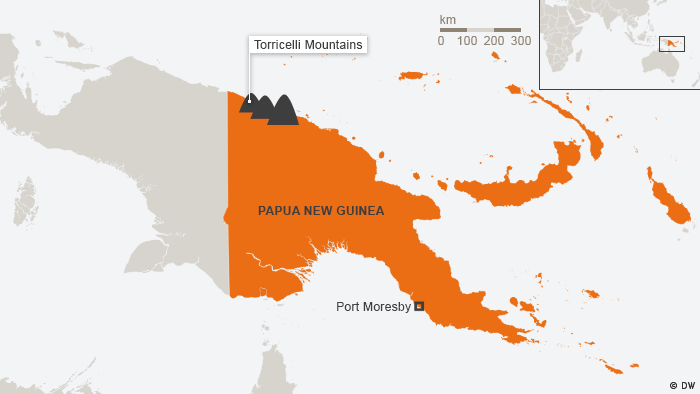
"Our approach to do that was not really the Australian approach - which would be about making it cute and cuddly in an anthropomorphic kind of way. It was more around looking at the culture, the cultural connection to the environment and to that particular species is what we tapped in to," Jean Thomas said.
"We developed songs around the culture and identity of that species," Jean Thomas explained. "We did lots of drama programs; we created a radio and a puppet show as a way of engaging youth and communities with all of their local species and the environment," she told DW.
Introducing alternative protein sources
In addition to getting people to build empathy around the species, the practical approach was to provide an alternative protein source, she added.
 TCA introduced rabbits, chickens and fish as alternative protein sources, and also embarked on an ambitious plan to bring water tanks up to the ridge-top villages. To date, TCA has installed around 250 water tanks and further 250 toilets in the villages in the Torricelli Mountains.
TCA introduced rabbits, chickens and fish as alternative protein sources, and also embarked on an ambitious plan to bring water tanks up to the ridge-top villages. To date, TCA has installed around 250 water tanks and further 250 toilets in the villages in the Torricelli Mountains.
Some of the most remarkable footage from the documentary Into the Jungle, directed by Mark Hanlin, shows villagers tramping up muddy paths and through swollen rivers carrying enormous water tanks, bags of cement and corrugated iron on their shoulders. The shared work drew together villagers.
Clean water to curb diseases
"There were some villages that we working together carrying water tanks for six to eight hours, and these villagers were previously enemies," Jean Thomas said.
A dependable clean water supply has reduced water-borne diseases, freed up time and energy for local women who traditionally travelled long distances for water, and enabled TCA to work on improving hygiene. Along with water and sanitation projects, TCA has built a rainforest research center, and is training locals in land management and literacy.
Since 2002, the project to save the Tenkile has grown into multi-pronged project across conservation, health, sanitation and education. In his acceptance speech at the 2013 Australian Geographic Conservationist of the Year awards, Jim Thomas explained that TCA's work is likely to expand in the coming years. He said the government of Papua New Guinea would like TCA to expand the program from 50 to 200 villages. "This will hopefully mean that we will be able to protect at least 180,000 hectares of mid-mountain tropical rainforest."
Date 02.06.2014
Author Janak Rogers, Melbourne
Editor Sarah Steffen
Source: Deutsche Welle
High court rules in favor of German president
- Details
- Category: Law & Justice
- Created on Wednesday, 11 June 2014 00:00
- Hits: 4401
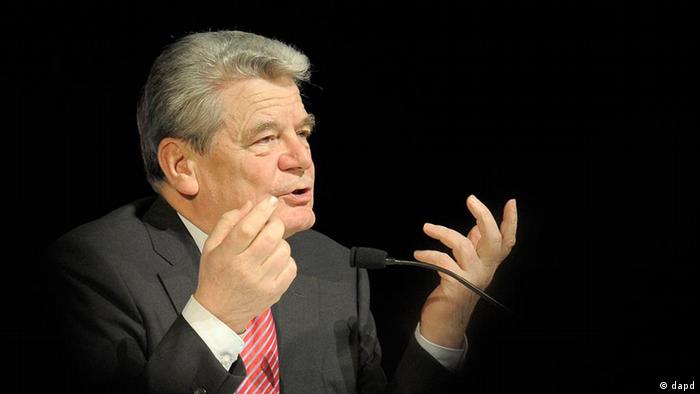 High court rules in favor of German president
High court rules in favor of German president
Germany's highest court has clarified in a ruling to what extent the country's president can freely express himself. A far-right group brought a case against President Gauck, alleging he called them "lunatics."
For the first time in the history of the Federal Republic of Germany, the country's highest court ruled on what a president is permitted and not permitted to say publicly. The case was brought by the far-right National Democratic Party (NPD). The group says comments made by the president violate German laws that guarantee all political parties equal footing during campaigning.
The case dates back to a speech made by President Joachim Gauck a few weeks before parliamentary elections in 2013. In reference to a series of right-wing protests, the president said to a group of schoolchildren that someone has to show these "lunatics" (German: "Spinner") their limits. The far-right protests had been directed against a residence for asylum seekers in Berlin, and the NPD supported the demonstrations. In February, Gauck had to attend a court hearing on his statements.
The Federal Constitutional Court's president, Andreas Vosskuhle, handed down the verdict in the case on Tuesday (10.06.2014). The ruling included an opinion that stakes out the boundaries of the president's right to political expression and did not, as thought, invoke even a mild admonishment for the head of state's comment. At any rate, its justification will be of great interest to the political and legal communities.
Representative function
Power is said to lend people a special aura, varying with how much they have - and that applies to the German president as well.
Gauck is primarily required to fulfill his duties as a representative of the nation. His only "weapons" are a pen used to sign and officially ratify laws passed by the federal government - a process in which he is supposed only to make sure that the legislative process was carried out lawfully - and his words.
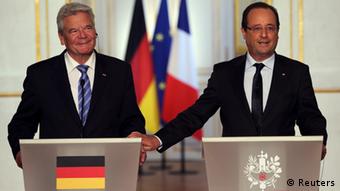 Holding the office of president obligates him to refrain from political maneuvering and to maintain neutrality among the political parties. However, he is also expected to pick up or instigate debates within society.
Holding the office of president obligates him to refrain from political maneuvering and to maintain neutrality among the political parties. However, he is also expected to pick up or instigate debates within society.
Among Gauck's predecessors to have exemplified that function are Richard von Weizsäcker in 1985 with his speech on the 40th anniversary of the end of World War II, including the line, "May 8 was a day of liberation."
In 1997, Roman Herzog became a political legend for his speech urging the country to go in new directions, saying, "A jolt must go through Germany," while Christian Wulff appealed for greater tolerance for minorities in 2012 with his line, "Islam is part of Germany."
The German president is "intended to be a figure who integrates people, who provides cohesion to all," said constitutional law scholar Volker Boehme-Nessler. "That's why he's required to be neutral on party politics and isn't allowed to judge what parties do."
Drawing lessons from history
The role now allotted to the country's president relates to the era of the Weimar Republic from 1919 to 1933. The authors of the German constitution did not want the president to grow as powerful as Paul von Hindenburg, who held the office from 1925 to 1934. He was able to rule without interference from parliament by way of executive orders and had sole authority over appointing the chancellor. Historians see structural errors at work in his term that ultimately led to Hitler's dictatorship. The fact that the president is not elected directly by the people but by a collective of elected officials also relates back to experiences from the first half of the 20th century.
But the high standard to which the president is held can also breed conflict. In 2010, then-President Horst Köhler was criticized for allegedly connecting German military missions abroad with securing the country's trade interests in a radio interview. Opponents said he had overstepped his bounds with the remarks and damaged his office. In response, Köhler unexpectedly renounced his position, becoming the first president to step down.
The public will be watching with interest to see how the constitutional court views the latest case involving Joachim Gauck. The president himself won't be on hand when the verdict is read. Instead, he begins an official visit to Norway for several days, starting Tuesday.
Date 10.06.2014
Author Kay-Alexander Scholz / gsw
Editor Gregg Benzow
Source: Deutsche Welle


